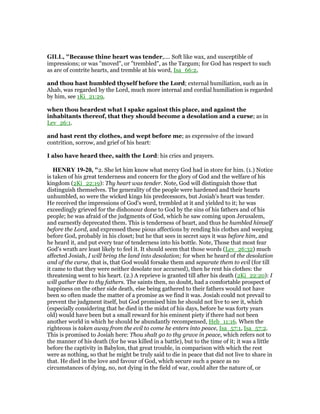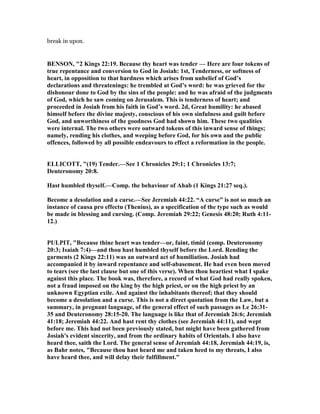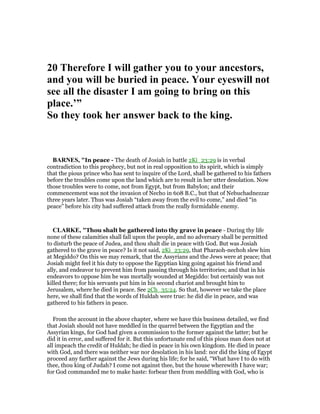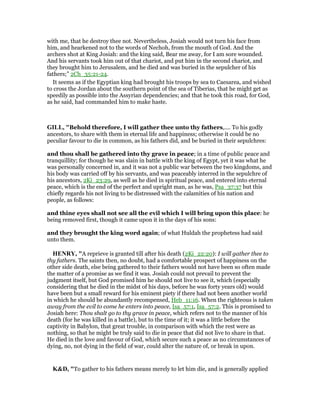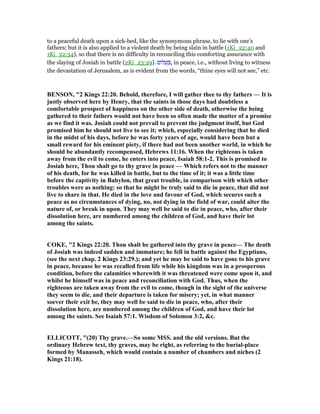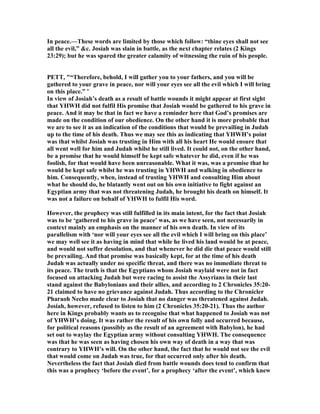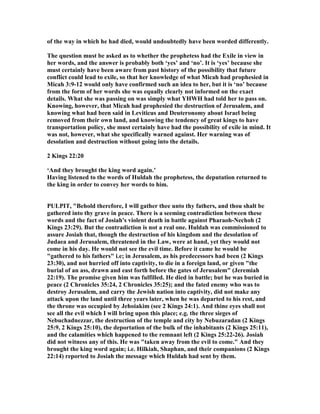Josiah began his reign over Judah at age eight. He reigned for thirty-one years in Jerusalem. Several commentators note that Josiah was one of the best kings of Judah, as he did what was right in God's sight and did not turn from following God's commands. Being young, he had not been influenced by the ungodly examples of his father and grandfather, and with God's grace, he sought to undo the spiritual damage of the prior reigns.
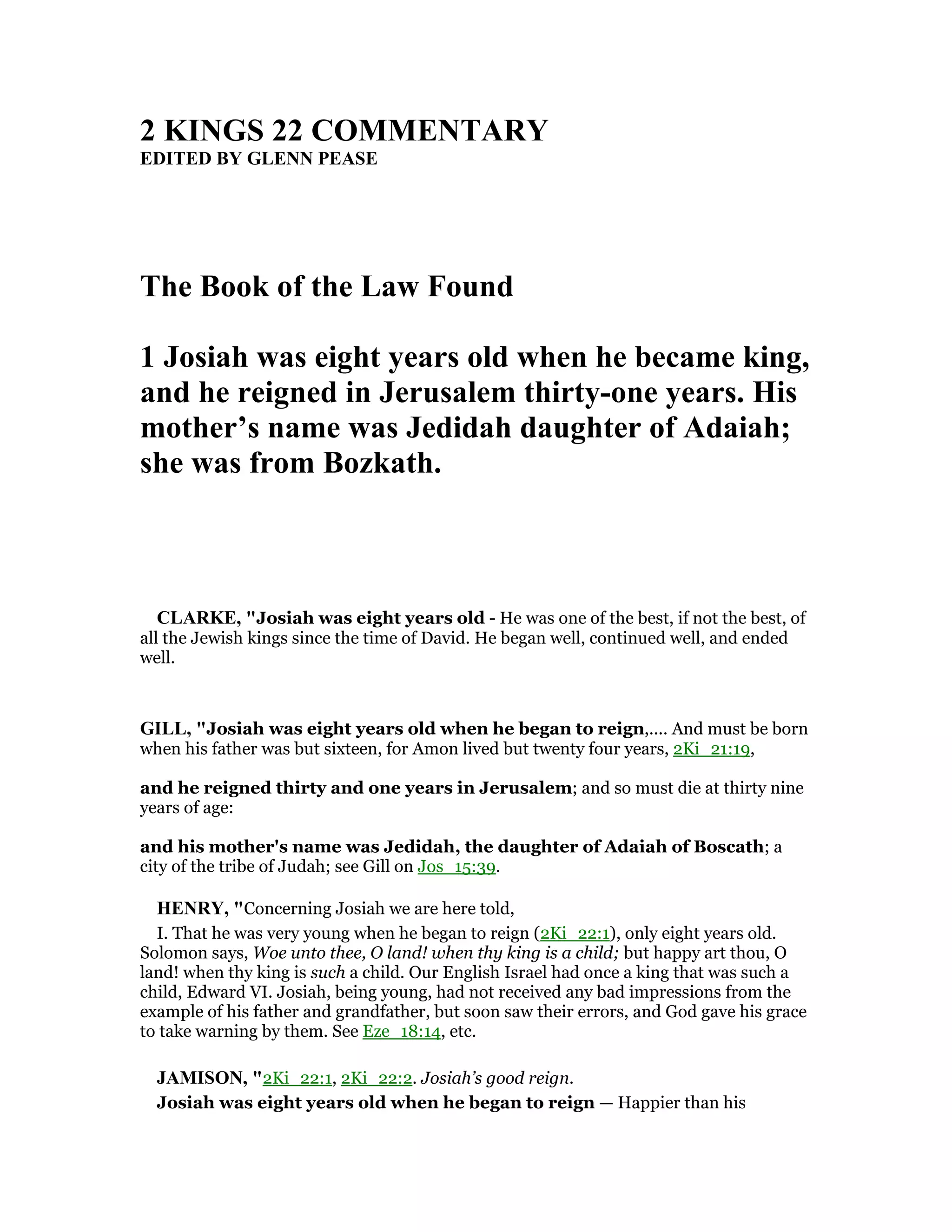
![grandfather Manasseh, he seems to have fallen during his minority under the care of
better guardians, who trained him in the principles and practice of piety; and so strongly
had his young affections been enlisted on the side of true and undefiled religion, that he
continued to adhere all his life, with undeviating perseverance, to the cause of God and
righteousness.
K&D, "Length and spirit of Josiah's reign. - Josiah (for the name, see at 1Ki_13:2),
like Hezekiah, trode once more in the footsteps of his pious forefather David, adhering
with the greatest constancy to the law of the Lord. He reigned thirty-one years. As a child
he had probably received a pious training from his mother; and when he had ascended
the throne, after the early death of his godless father, he was under the guidance of pious
men who were faithfully devoted to the law of the Lord, and who turned his heart to the
God of their fathers, as was the case with Joash in 2Ki_12:3, although there is no
allusion to guardianship. His mother Jedidah, the daughter of Adaiah, was of Boscath, a
city in the plain of Judah, of which nothing further is known (see at Jos_15:39). The
description of his character, “he turned not aside to the right hand and to the left,” sc.
from that which was right in the eyes of the Lord, is based upon Deu_5:29; Deu_17:11,
Deu_17:20, and Deu_28:14, and expresses an unwavering adherence to the law of the
Lord.
BE SO , ". Josiah was eight years old when he began to reign — Being young, he
had not received any bad impressions from the example of his father and
grandfather, but soon saw their errors, and God gave him grace to take warning by
them. He saw his father’s sins, and considered, and did not the like, Ezekiel 18:14.
He did that which was right in the sight of the Lord — See the power of divine
grace! Although he was born of a wicked father, had neither had a good education
given him, nor a good example set him, but many about him, who, no doubt, advised
him to tread in his father’s steps, and few that gave him any good counsel; yet the
grace of God makes him an eminent saint, cuts him off from the wild olive, grafts
him into the good olive, and renders him fruitful to God’s glory, and the profit of
myriads. He walked in a good way, and turned not aside, as some of his
predecessors had done who began well, to the right hand or to the left. There are
errors on both hands, but God kept him in the right way: he fell not either into
superstition or profaneness.
COFFMA , ""He reigned thirty and one years in Jerusalem" (2 Kings 22:1). The
date of this reign by Montgomery was 639-608 B.C.[1] "The death of Josiah may be
accurately dated by the Babylonian Chronicle in 609 B.C; therefore, he became king
in 639 B.C."[2] This period of almost forty years was a crucial one in world history.
"The Scythian invasion, the fall of Assyria, the formation of the Median empire, and
the foundation of the Babylonian empire by abopolasar all occurred during this
time."[3]
The righteousness of this monarch is recorded here in words that are matched only](https://image.slidesharecdn.com/2kings22commentary-170511172018/85/2-kings-22-commentary-2-320.jpg)
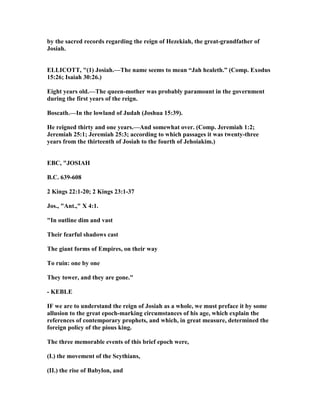
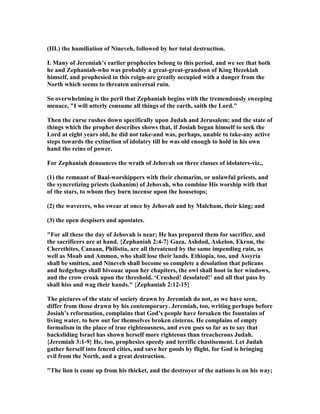
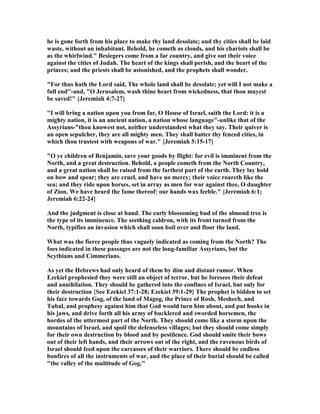
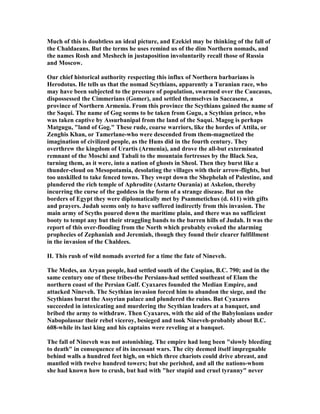
![known how to govern-shouted for joy-that joy finds its triumphant expression in
more than one of the prophets, but specially in the vivid paean of ahum. His date
is approximately fixed at about B.C. 600, by his reference to the atrocities inflicted
by Assurbnipal on the Egyptian city of o-Amon. "Art thou [ ineveh] better," he
asks, than o-Amon, "that was situate among the canals, that had the water round
about her, whose rampart was the ile, and her wall was the waters? Yet she went
into captivity! Her young children were dashed to pieces at the head of all the
streets: they cast lots for her honorable men, and all her great men were bound in
chains. Thou also shalt be drunken: thou shalt faint away, thou shalt seek a
stronghold because of the enemy." { ahum 3:8-11}
All the details of her fall are dim; but ineveh was, in the language of the prophets,
swept with the besom of destruction. Her ruins became stones of emptiness, and the
line of confusion was stretched over her. ahum ends with the cry, -
"There is no assuaging of thy hurt; thy wound is grievous:
All that hear the bruit of this, clap the hands over thee:
For upon whom hath thy wickedness not passed continually?"
In truth, Assyria, the ferocious foe of Israel, of Judah, and all the world, vanished
suddenly, like a dream when one awaketh; and those who passed over its ruins, like
Xenophon and his Ten Thousand in B.C. 401, knew not what they were. Her very
name had become forgotten in two centuries, "Etiam periere ruinae!" The burnt
relics and cracked tablets of her former splendor began to be revealed to the world
once more in 1842, and it is only during the last quarter of a century that the
fragments of her history have been laboriously deciphered.
III Such were the events witnessed in their germs or in their completion by the
contemporaries of Josiah and the prophets who adorned his reign. It was during
this period, also, that the power to whom the ultimate ruin and captivity of
Jerusalem was due sprang into formidable proportions. The ultimate scourge of
God to the guilty people and the guilty city was not to be the Assyrian, nor the
Scythian, nor the Egyptian, nor any of the old Canaanite or Semitic foes of Israel,
nor the Phoenician, nor the Philistine. With all these she had long contended, and
held her own. It was before the Chaldee that she was doomed to fall, and the
Chaldee was a new phenomenon of which the existence had hardly been recognized
as a danger till the warning prophecy of Isaiah to Hezekiah after the embassy of the
rebel viceroy Merodach-Baladan.
It is to Habakkuk, in prophecies written very shortly after the death of Josiah, that
we must look for the impression of terror caused by the Chaldees.
abopolassar, sent by the successor of Assurbanipal to quell a Chaldaean revolt,
seized the viceroyalty of Babylon, and joined Cyaxares in the overthrow of ineveh.
From that time Babylon became greater and more terrible than ineveh, whose](https://image.slidesharecdn.com/2kings22commentary-170511172018/85/2-kings-22-commentary-7-320.jpg)
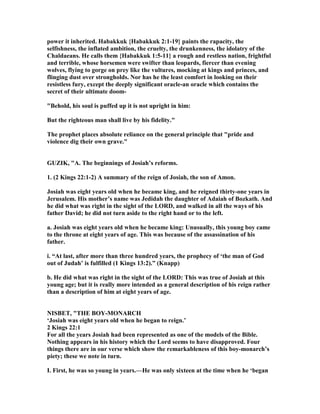
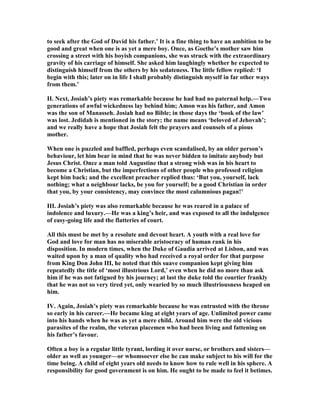
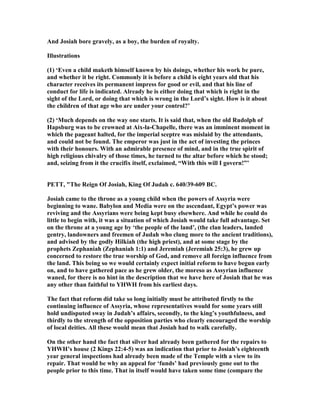
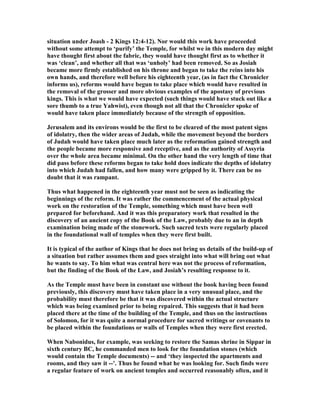
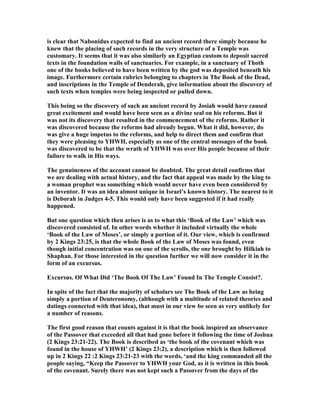
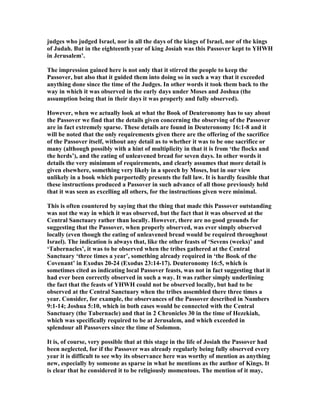
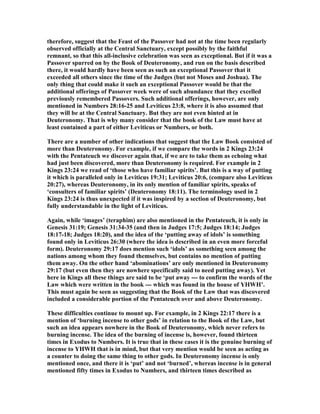
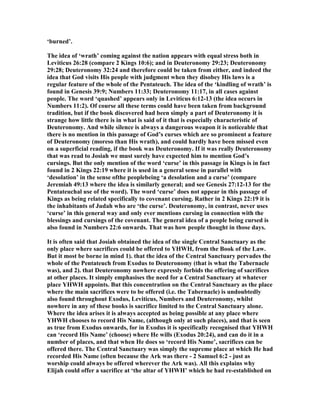
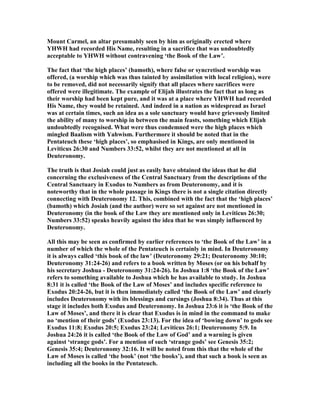
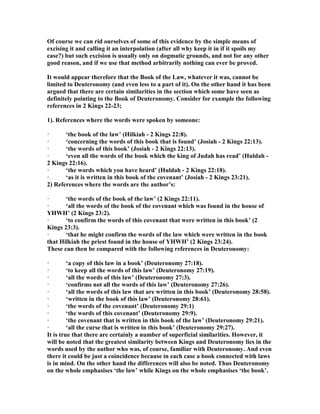
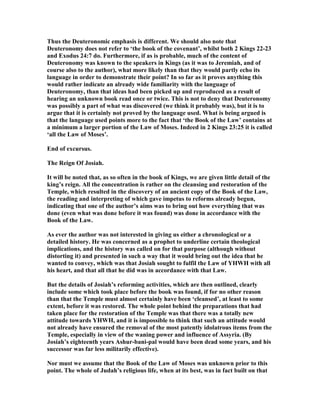
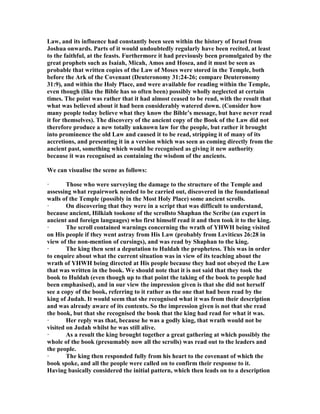
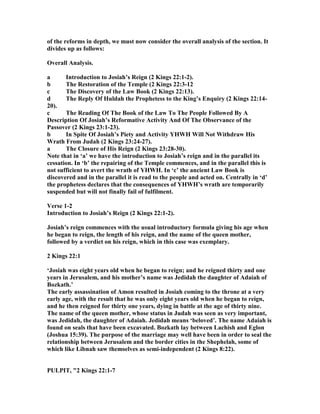
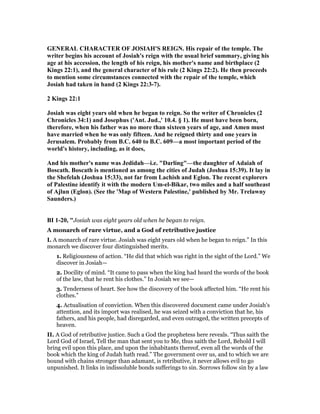
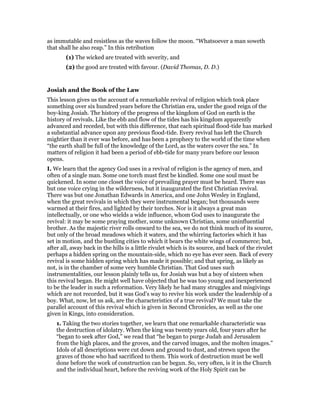
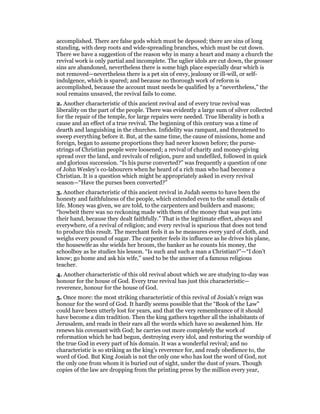
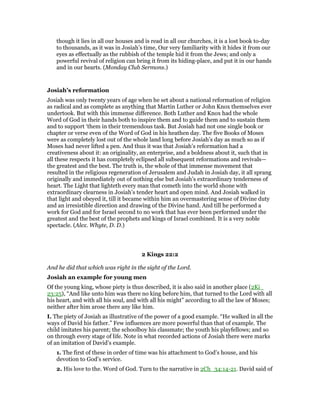
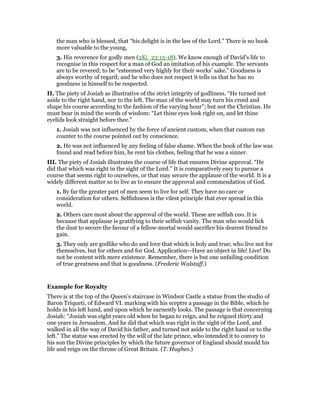
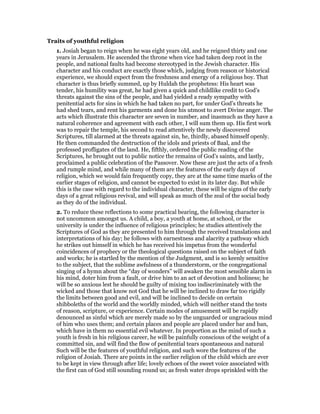
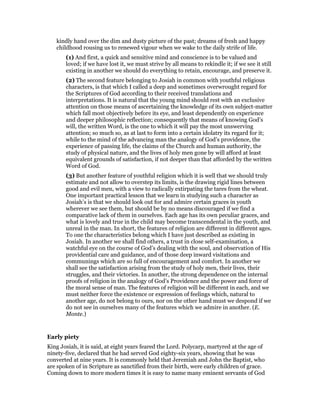
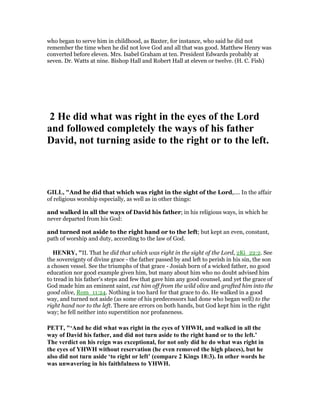
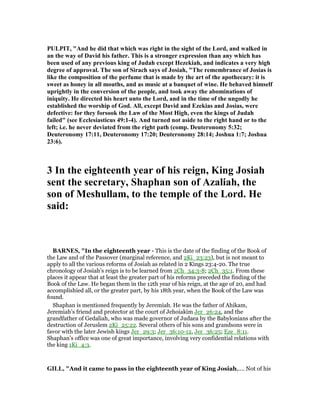
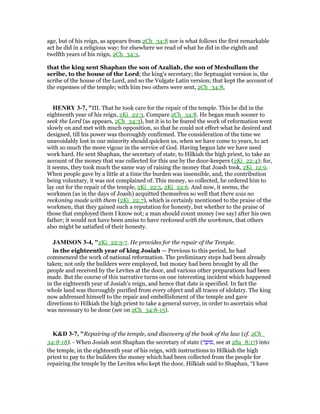
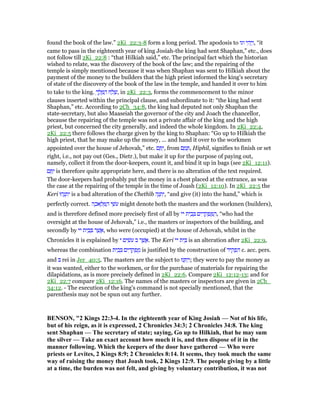
![complained of. This money, so collected, he ordered Hilkiah to lay out for the
repairs of the temple, 2 Kings 22:5-6. And now the workmen, as in the days of
Joash, acquitted themselves so well, that there was no reckoning made with them.
This is certainly mentioned to the praise of the workmen, that they gained such a
reputation for honesty, but whether to the praise of them that employed them may
well be doubted. Many will think it would not have been amiss to have reckoned
with them, had it been only that others might be satisfied.
COFFMA , "The appearance of this paragraph just here was to set the occasion
for the discovery of The Book mentioned in the next verse. The parallel account in 2
Chronicles 34:3-7 indicates that Josiah's reforms had already been going forward
for a number of years. Keil referred to this paragraph as "a parenthesis."[4] "He
began the purging of the temple and of Jerusalem in his twelfth year, six full years
before the events in 2 Kings 22:8, and the repairs on the temple mentioned in 2
Kings 22:9 were probably commenced at the same time."[5] "The greater part of
Josiah's reforms preceded the finding of the Book of the Law."[6]
"Shaphan" (2 Kings 22:3). This man was the father of Jeremiah's friend Ahikam
(Jeremiah 26:24) and the grandfather of Gedaliah, who was made governor of
Judea by the Babylonians after the fall of Jerusalem (2 Kings 25:22).
"Hilkiah" (2 Kings 22:4) "was the father, or grandfather, of Seriah ( ehemiah
11:11), High Priest at the time of the captivity, and an ancestor of Ezra the
scribe."[7]
A SPECIAL EXCURSUS O THE BOOK WAS DISCOVERED BY HILKIAH
This writer has long been fully convinced that the fraudulent claims of radical
critics regarding the discovery of what they have dared to call "a portion of the
Book of Deuteronomy," is in no sense whatever supported either by any known fact,
by any text in the Word of God, or by any rational argument whatever:
(1) We shall first review the allegations that have been popular among critics
throughout the first half of this century.
(2) Then we shall cite the writings of some of the greatest scholars of the ages who
have effectively denied the unsupported, imaginary claims.
(3) Then we shall cite some of impossibilities which attend any logical acceptance of
that great critical fraud, comparable in every way with another great scholarly
fraud known as Piltdown Man.
I. A SUMMARY OF FALSE ALLEGATIO S REGARDI G THAT BOOK
In 1936, Edgar J. Goodspeed, writing from that hotbed of atheism, in the University
of Chicago, wrote that, "It was the Book of Deuteronomy, in substance, that was](https://image.slidesharecdn.com/2kings22commentary-170511172018/85/2-kings-22-commentary-32-320.jpg)
![found and put into effect by Josiah in 621 B.C."[8] Thenius alleged that this nucleus
was later "worked up into the Pentateuch."[9]
A great critical scholar named Wette, quoted by Charles G. Martin in The ew
Layman's Bible Commentary, wrote regarding this discovery, that, "It was a pious
fraud planted by priests wishing to reform the abuses of Manasseh's reign."[10]
This of course (if true) makes the entire Book of 2Kings nothing but a falsehood!
"It was the early critical view that the book which was found was the so-called `D'
document (probably Deuteronomy 12-26) which had been recently written (Snaith
placed the date of its being written as during the period of Manasseh's evil reign,
and before his conversion),[11] and was `found' to give it prestige"![12] LaSor
added that, "Radical scholars have so often modified this view that little remains of
the original theory."[13]
Dentan expressed another erroneous view of "that book." "It converted Josiah's
rather superficial attempt at national renewal into a basic reformation."[14] This is
contrary to the fact that the reformation had already been in progress for six years!
In addition to the outright charges of fraud and hypocrisy by the high priest, and by
that alleged "Prophetical Party" that manipulated the discovery of that "pious
fraud," there are also some BASIC ASSUMPTIO S of the radical, destructive
critics which must be included as part of their foolish and erroneous allegations!
A. It is ASSUMED that the Holy Books of Moses which had existed from the times
of the Exodus were either non-existent, or totally forgotten by the entire Jewish
nation. This canard limits the reforms of Josiah to that alleged "D" document. As a
matter of fact, the suppression of the idolatrous priests, a key factor in the
reformation is not even mentioned in Deuteronomy! The reforms of Josiah were
influenced by only, "Limited stipulations in the Book of Deuteronomy."[15]
B. It is a part of the evil theory that what is now known as the Law of Moses was
unknown by Josiah, and that his knowledge of it was LIMITED to that imaginary
"D" document. All of those reforms which had been in progress for six years were
following instructions already known to all in the Law of Moses. The so-called "D"
document, and for that matter, even the whole Book of Deuteronomy had but little
to do with the reformation.
C. It is SUPPOSED that Josiah's inquiry of Huldah was for the purpose of learning
whether or not that "D" document was really God's Word or not. On the contrary,
that was, in no sense, the request he made of Huldah, as definitely indicated by
Huldah's prophetic answer.
D. It is ASSUMED that the Jewish people had no way of knowing whether or not
that "D" document was inspired or not, except by the testimony of Huldah. There
were, on the contrary, many proofs available to expose the fraud of that discovery, if
it had been a fraud.](https://image.slidesharecdn.com/2kings22commentary-170511172018/85/2-kings-22-commentary-33-320.jpg)
![E. Josiah's reformation is treated as if it were SOMETHI G BRA D EW in
Judah, which it was not!
F. It is FALSELY SUPPOSED that Josiah regarded that alleged "D" document as a
new thing, but such a view is contrary to repeated statements in Kings.
G. "The general agreement is that `the scroll discovered contained the nucleus of the
present Book of Deuteronomy' (Deuteronomy 12-26)."[16] This CO CEIT among
critical scholars is rather amazing, because it is so blatantly incorrect. There is O
SUCH GE ERAL AGREEME T, not even among the critics themselves who issue
a new revision of their crooked theory every few years, every time some new
seminarian sees the foolishness of it and attempts to revise it to fit the facts. Also the
great scholars of the present generation have rejected the theory outright!
The general statements that we have made here with reference to this "D"
document theory will now be pinpointed with specific findings of some of the great
scholars of the past and of our own generation.
II. SCHOLARLY REFUTATIO OF THE "D" DOCUME T THEORY
Josephus, the great Jewish historian, appealed to frequently by the radical critics,
but rejected when his writings contradict their theories, tells us exactly what was
discovered by those workmen in the temple. "As the High Priest was bringing out
the gold, he lighted upon the Holy Books of Moses that were laid up in the temple;
and he gave them to Shaphan the scribe, who when he had read them, he brought
them to the king, and informed him that all the work he had commanded had been
finished."[17] (1) The "discovery" was at the end of the period of repairing the
temple. (2) The scribe read the books before presenting them to the king, and that
enabled him to focus upon certain pertinent passages which he then read to king
Josiah. ow the odds against Josephus being wrong about any of this are a billion to
one!
"I have found the book of the law in the house of Jehovah" (2 Kings 22:8) The
testimony of the Word of God as we have received it is emphatic. C. F. Keil,
certainly the equal or superior, of any scholar of the last century, wrote that, "The
Hebrew word here rendered `THE BOOK OF THE LAW' (not `a law book' or `a
scroll') cannot mean anything else, either grammatically or historically, than the
Mosaic Book of the Law, the Pentateuch, which is so designated, as is generally
admitted, and as the word is used throughout the Chronicles and in Ezra and
ehemiah."[18] If one will not receive the testimony of Josephus, let him receive the
testimony of the Word of God.
"The book of the law that was found was simply the temple copy of the Pentateuch,
deposited by the side of the ark of the covenant (Deuteronomy 31:26)."[19] This
copy had either been misplaced, or, as is most likely, hidden during the abominable
reigns of Mannasseh and Amon. There is no valid reason whatever for rejecting the](https://image.slidesharecdn.com/2kings22commentary-170511172018/85/2-kings-22-commentary-34-320.jpg)
![opinion of Adam Clarke that, "The simple fact seems to be this, that this was the
original book of the covenant renewed by Moses on the plains of Moab, and which
the Great Lawgiver ordered to be laid up beside the ark of the covenant
(Deuteronomy 31:26)."[20] Clarke defended this viewpoint on the basis that the
remarkable attention paid to the "discovery" can be explained only on the basis of:
"(1) the unexpectedness of its being found; (2) its manifest antiquity; (3) the glorious
historical occasion of its having been made and placed in the tabernacle by Moses
himself; (4) the deplorable circumstances in which God's people found themselves;
and (5) the happy coincidence of such a discovery being made during that great
reformation under Josiah which was still in progress."[21] It seems to this writer
that such considerations as these, alone could have produced the effect that surely
followed the discovery. The ridiculous notion that some unheard of "brand new
scroll," however cleverly forged and imposed upon the king as genuine, could
possibly explain what happened here is rationally untenable.
We shall now review the basic assumptions that are necessarily a part of this false
theory, those that are mentioned under the alphabetical sections above.
(A) It is not only untrue, but PREPOSTEROUS TO SUPPOSE that there were no
copies of the Torah (the Pentateuch) extant in Judah in the days of Josiah. "All of
the Jewish liturgies used in the daily services in the temple embodied large sections
of the Law of Moses; the Samaritans (adjacent to Judah) possessed the Samaritan
Pentateuch; there were doubtless many copies throughout Judah found among
learned and devout Jews, and in the schools of the prophets, either in fragments or
entire sections and books; furthermore, there were nearly innumerable quotations
of the Pentateuch found throughout the entire literature of ancient Israel, notably in
the Psalms and in the writings of both the major prophets and the minor prophets,
in which direct quotations from the Books of Moses are found on almost every
page"![22] All of the Pentateuch is represented in those quotations.
In this connection, this writer would also like to testify that there is hardly a page in
any of the prophets, or in the Psalms, which does not reflect either direct or indirect
quotations from the Torah (all of it). All the infidels on earth cannot hide the fact
that the entire O.T. following the Pentateuch is written in the shadow of it, as
attested by almost innumerable references to it, and we have cited literally hundreds
of these in our commentaries on those books.
(B) The FALSE THEORY that Josiah's reforms were founded on that ALLEGED
"D" document is disproved by the facts that: (1) Manasseh himself had undertaken
to effect such reforms and bring all the people back to Jehovah (2 Chronicles
33:14ff), basing such reforms on the Torah which certainly existed when he did so.
(2) Likewise, Jehoash repaired the temple and instituted reforms founded upon the
same source, namely the Torah (2 Kings 12ff). One of the great things that Josiah
did was to suppress the idolatrous priests (2 Kings 23:5), and that is not even
mentioned in Deuteronomy. Thus, it is clear that no "D" document had anything to
do with his reforms, nor for that matter, in any exclusive sense, the whole Book of
Deuteronomy!](https://image.slidesharecdn.com/2kings22commentary-170511172018/85/2-kings-22-commentary-35-320.jpg)
![(C) On the ALLEGATIO of the critics that Josiah inquired of Huldah as to the
validity of those Holy Books of Moses found in the temple, the answer of Huldah
denies such an opinion altogether. Regarding this, we submit the words of Dr.
Harold Stigers, in Covenant College and Theological Seminary, St. Louis, Missouri.
He paraphrased the king's inquiry of Huldah thus, "Go find out if these eminent
judgments can be stayed."[23]
That this is indeed what king Josiah inquired of Huldah is evident in her reply
which addressed exactly that question and none other. There was never any
question in anybody's mind regarding the authenticity of the Holy Books of Moses,
their antiquity alone was all the proof needed. Some nine centuries had passed since
Moses had ordered those books to be deposited beside the ark of God; but the fact
of their being so long preserved is not a problem. Today, we may read the Dead Sea
Scrolls, after more than two millenniums. Besides that, new copies might have been
prepared and deposited in later times following Moses' death.
(D) The notion that the Jews had no way of evaluating the "discovery" as to its
authenticity or not, except by an appeal to Huldah overlooks completely the
THOROUGH K OWLEDGE of the Jews of their sacred writings. As apparently
assumed by the critical enemies of our text, the Jews were a nation of ignoramuses
who could have been easily imposed upon and deceived by such a dirty little fraud
as what underlies their fairy-tale theory. This writer cannot believe a word of it. The
knowledge and intellectual ability of the great prophets known throughout Israel
during that very period, namely, Isaiah, Jeremiah, and all the others, constituted the
intellectual cream of that entire seventh century. The critics have over-reached
themselves in this worthless theory!
(E) We have already noted that Josiah's reformation was exactly the SAME kind of
reform as that improperly carried out by Jehoahaz, Hezekiah, and even by
Manasseh.
(F) It is ASSUMED by critics that Josiah considered that alleged "D" document as
SOMETHI G EW, but note these words:
"King Josiah said, Our fathers have not hearkened unto the words of this book, to
do according to all that is written concerning us (2 Kings 22:13). This says, in tones
of thunder, that Josiah recognized that "discovery" as something the fathers had
possessed for ages and that they had disobeyed its commandments. It takes some
kind of a fantastic imagination to get some "brand new document," and a forged
one at that, out of the sacred words recorded here.
III. SOME IMPOSSIBILITIES THAT FORBID ACCEPTA CE OF THIS GREAT
CRITICAL FRAUD
This writer prays that his readers will not feel that the severe charges here leveled
against false critics is in any sense uncharitable. It is not this writer who initiated](https://image.slidesharecdn.com/2kings22commentary-170511172018/85/2-kings-22-commentary-36-320.jpg)
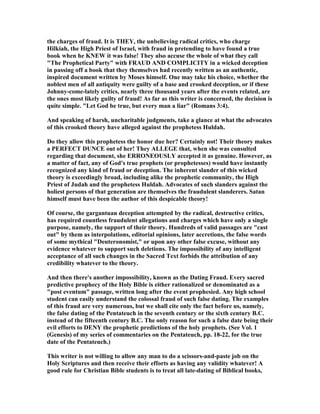
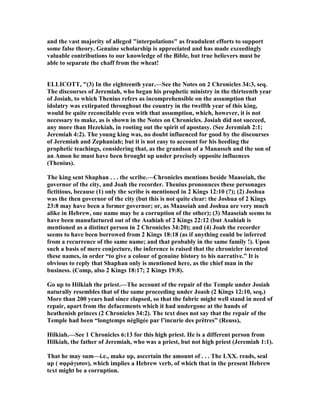
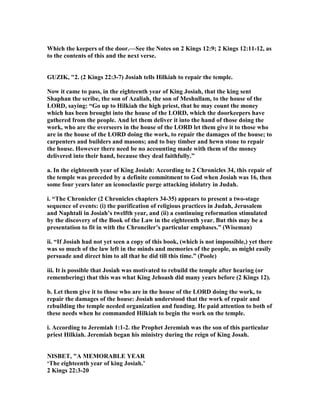
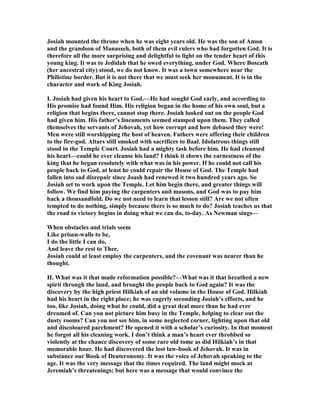
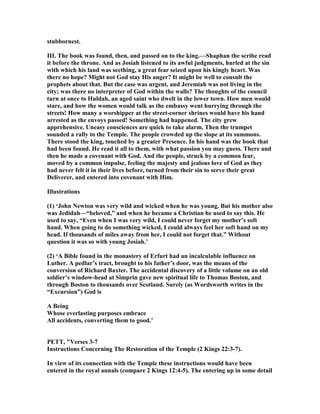
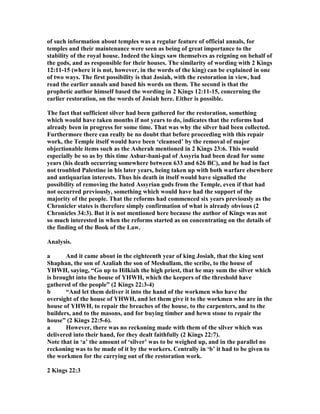
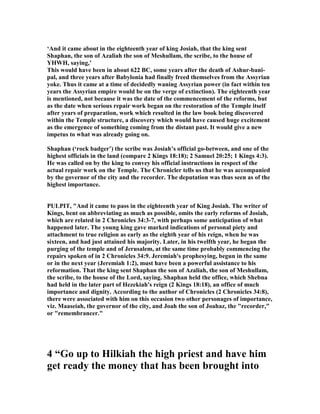
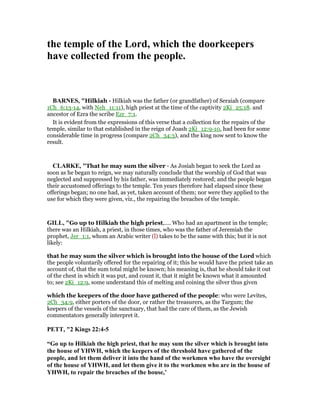
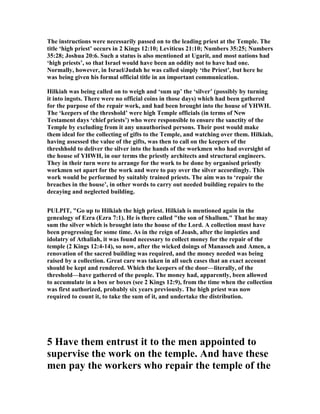
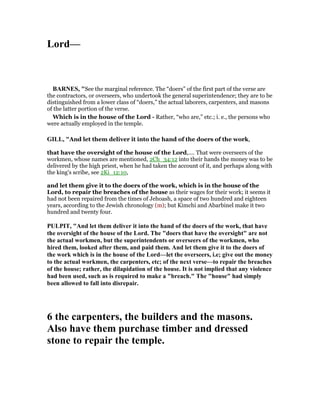
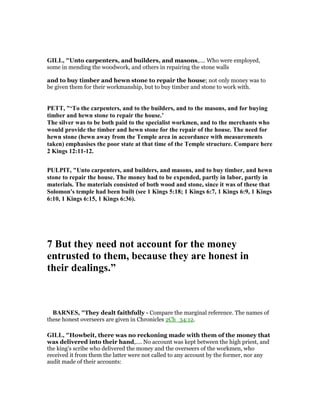
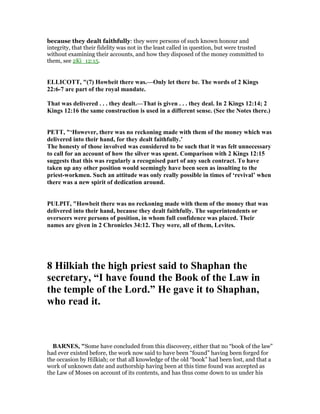
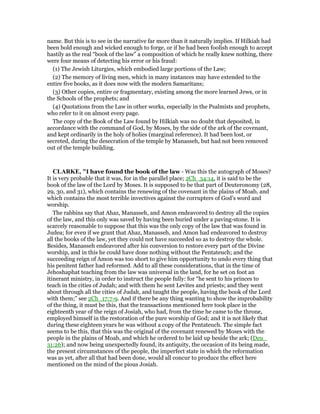
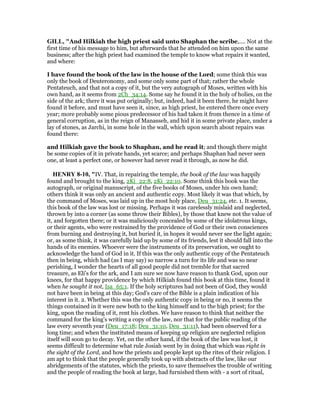
![directing them in the observances of their religion, but leaving out what they thought fit,
and particularly the promises and threatenings (Lev. 26 and Deu. 28, etc.), for I observe
that these were the portions of the law which Josiah was so much affected with (2Ki_
22:13), for these were new to him. No summaries, extracts, or collections, out of the
Bible (though they may have their use) can be effectual to convey and preserve the
knowledge of God and his will like the Bible itself. It was no marvel that the people were
so corrupt when the book of the law was such a scarce thing among them; where that
vision is not the people perish. Those that endeavoured to debauch them no doubt used
all the arts they could to get that book out of their hands. The church of Rome could not
keep up the use of images but by forbidding the use of the scripture. 3. It was a great
instance of God's favour, and a token for good to Josiah and his people, that the book of
the law was thus seasonably brought to light, to direct and quicken that blessed
reformation which Josiah had begun. It is a sign that God has mercy in store for a people
when he magnifies his law among them and makes that honourable, and furnishes them
with means for the increase of scripture-knowledge. The translating of the scriptures
into vulgar tongues was the glory, strength, and joy of the Reformation from Popery. It is
observable that they were about a good work, repairing the temple, when they found the
book of the law. Those that do their duty according to their knowledge shall have their
knowledge increased. To him that hath shall be given. The book of the law was an
abundant recompence for all their care and cost about the repair of the temple. 4.
Hilkiah the priest was exceedingly well pleased with the discovery. “O,” says he to
Shaphan, “rejoice with me, for I have found the book of the law, heurēka, heurēka, - I
have found, I have found, that jewel of inestimable value. Here, carry it to the king; it is
the richest jewel of his crown. Read it before him. He walks in the way of David his
father, and, if he be like him, he will love the book of the law and bid that welcome; that
will be his delight and his counsellor.”
JAMISO 8-11, "2Ki_22:8-15. Hilkiah finds the Book of the Law.
Hilkiah said ... I have found the book of the law in the house of the Lord,
etc. — that is, the law of Moses, the Pentateuch. It was the temple copy which, had been
laid (Deu_31:25, Deu_31:26) beside the ark in the most holy place. During the ungodly
reigns of Manasseh and Amon - or perhaps under Ahaz, when the temple itself had been
profaned by idols, and the ark also (2Ch_35:3) removed from its site; it was somehow
lost, and was now found again during the repair of the temple [Keil]. Delivered by
Hilkiah the discoverer to Shaphan the scribe [2Ki_22:8], it was by the latter shown and
read to the king. It is thought, with great probability, that the passage read to the king,
and by which the royal mind was so greatly excited, was a portion of Deuteronomy, the
twenty-eighth, twenty-ninth, and thirtieth chapters, in which is recorded a renewal of
the national covenant, and an enumeration of the terrible threats and curses denounced
against all who violated the law, whether prince or people. The impressions of grief and
terror which the reading produced on the mind of Josiah have seemed to many
unaccountable. But, as it is certain from the extensive and familiar knowledge displayed
by the prophets, that there were numbers of other copies in popular circulation, the king
must have known its sacred contents in some degree. But he might have been a stranger
to the passage read him, or the reading of it might, in the peculiar circumstances, have
found a way to his heart in a manner that he never felt before. His strong faith in the
divine word, and his painful consciousness that the woeful and long-continued
apostasies of the nation had exposed them to the infliction of the judgments denounced,](https://image.slidesharecdn.com/2kings22commentary-170511172018/85/2-kings-22-commentary-51-320.jpg)
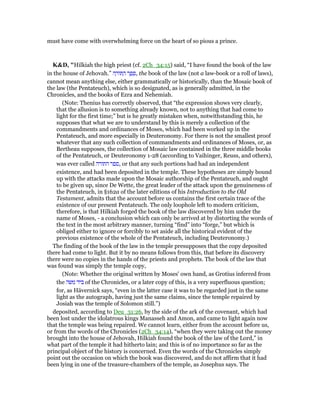
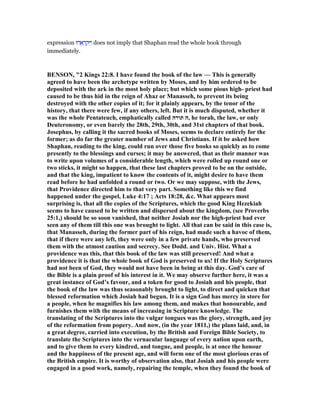
![the law. They that do their duty according to their knowledge, shall have their
knowledge increased. To him that hath shall be given. The book of the law was an
abundant recompense for all their care and cost in repairing the temple.
COFFMA , "Much of this paragraph was discussed in the excursus above, but two
or three things should be emphasized. It is especially important to note that before
the scribe read that book to the king, he first read the whole book himself (see the
comment by Josephus above), enabling him to read only selected, special portions of
it to the king. That this is true appears from Josiah's response and from his message
to the prophetess. This effectively refutes the conclusion of radical critics who make
what they call the brief time indicated for the reading the book the false basis of
their judging the size of it to be very, very small. "Shaphan read only portions of the
book to the king."[24] This conclusion is mandatory, "Because, where the author
intended to say that the whole book was read, he used a different set of words
altogether: `The king read in their ears all the words of the book of the covenant (2
Kings 23:2)."[25] Such was not said here.
"Go ye, inquire of Jehovah for me" (2 Kings 22:13). "From the times of Moses to
David, inquiring of the Lord was by means of the Urim and Thummin; but after
David's time, such inquiries were always made by the consultation of a
prophet."[26] Jeremiah and other prophets were contemporary with Josiah, and it
seems strange that Huldah, the prophetess hitherto unknown, was the person
through whom the inquiry was made. As Dentan said, "This is a useful reminder of
the truth that posterity often has a more accurate judgment of a man's importance
than do his contemporaries."[27] A more likely explanation, however, is that
Huldah lived in Jerusalem (which is here stated), whereas Jeremiah lived in
Anathoth.
It should be noted especially that Josiah's inquiry had nothing whatever to do with
whether or not "the book" was authentic; there could have been no doubt whatever
in any person's mind about that. The question in Josiah's mind regarded whether or
not the great curses and penalties foretold by the prophet Moses as the consequence
of Israel's apostasy were due for an immediate fulfillment. Huldah's answer
indicated that she understood exactly that as the king's question.
COKE, ". I have found the book of the law— This is generally agreed to have been
the archetype written by Moses, and by him ordered to be deposited with the ark, in
the most holy place, but which some pious high-priest had caused to be thus hid in
the reign of Ahaz or Manasseh, to prevent its being destroyed with all the other
copies of it; for it plainly appears by the tenour of the history, that this was the only
perfect one left. But it is much disputed, whether it was the whole Pentateuch,
emphatically called התורה hattorah, the law, or only Deuteronomy, or even barely
the 28th, 29th, 30th, and 31st chapters of it. Josephus, by calling it "the sacred
books of Moses," seems to declare entirely for the former; others have declared for
the latter, because the book of Deuteronomy is a kind of repetition or epitome of the](https://image.slidesharecdn.com/2kings22commentary-170511172018/85/2-kings-22-commentary-54-320.jpg)
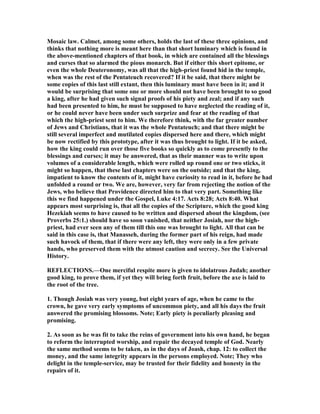
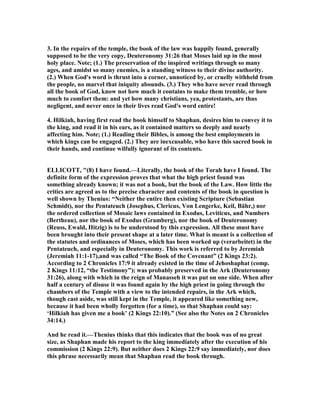
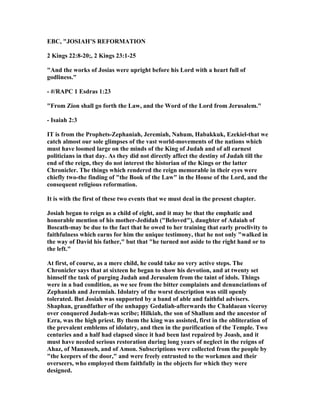
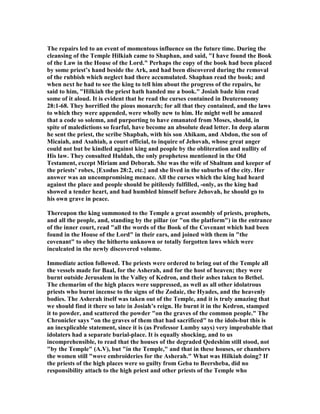
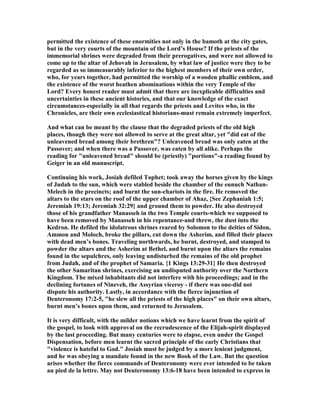
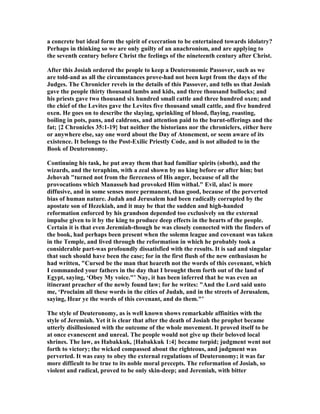
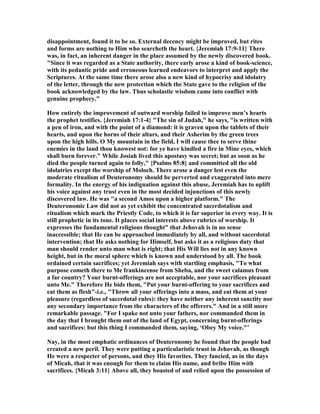
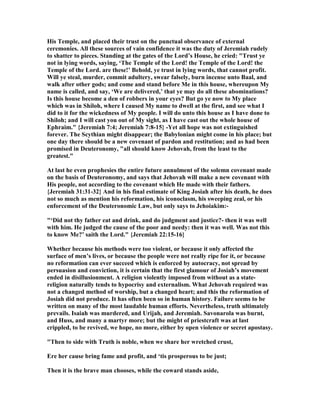
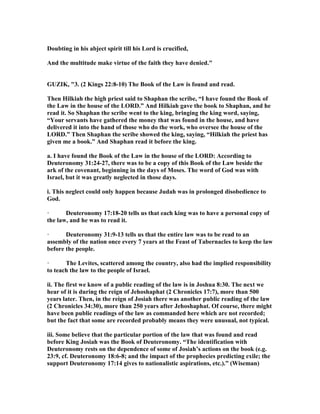
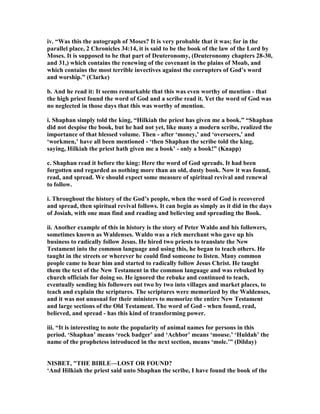
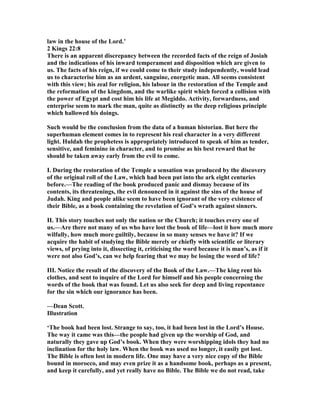
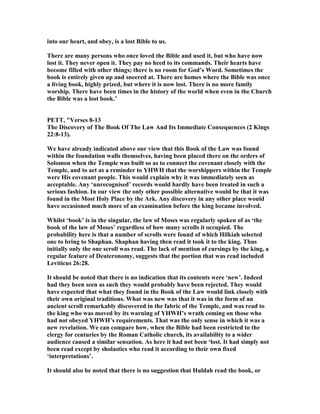
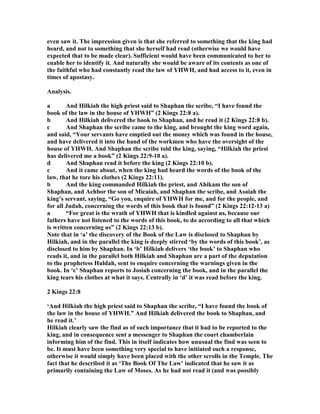
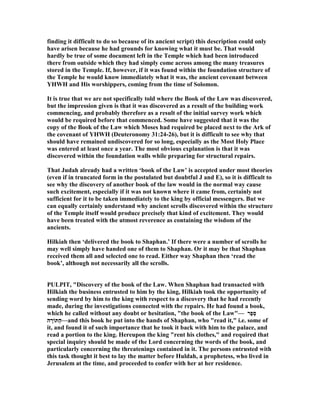
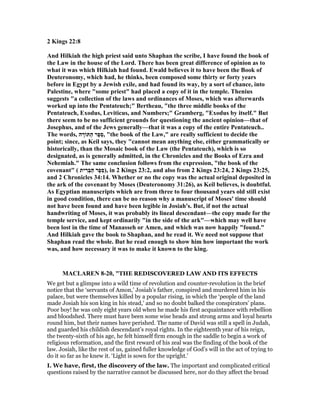
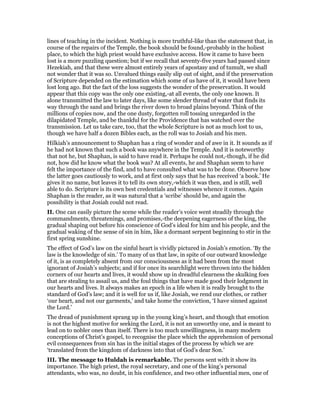
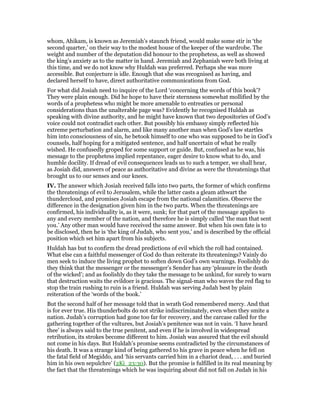
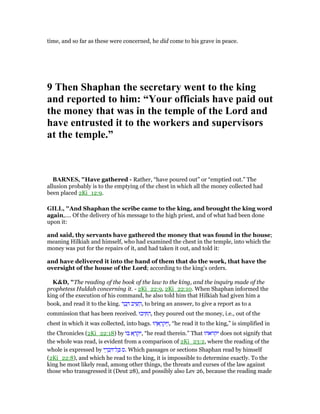
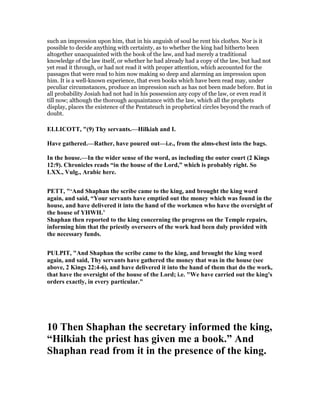
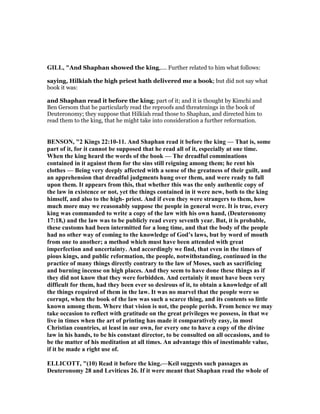
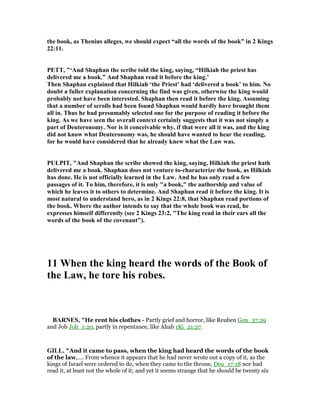
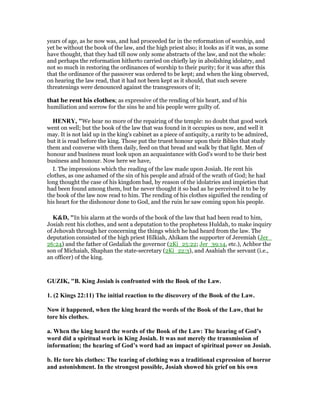
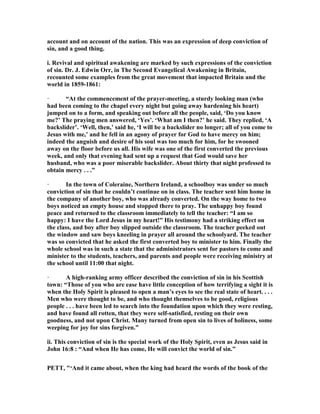
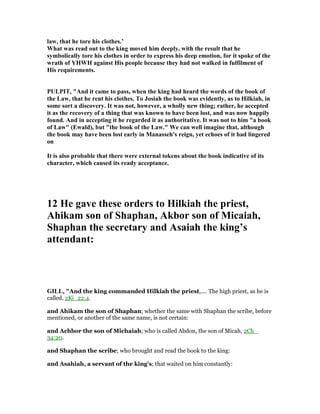
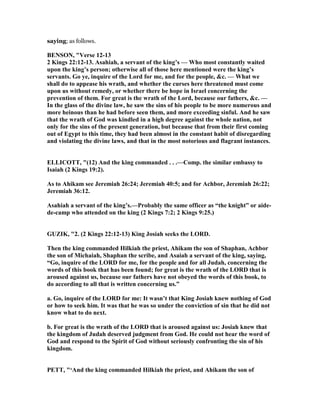
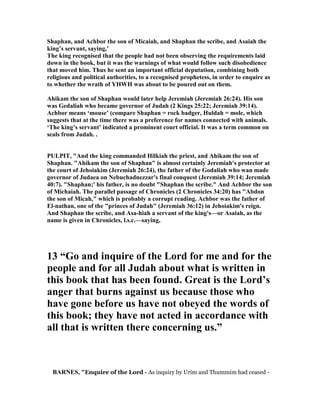
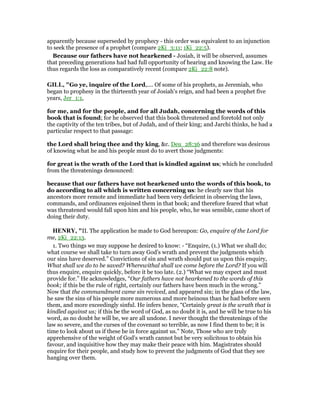
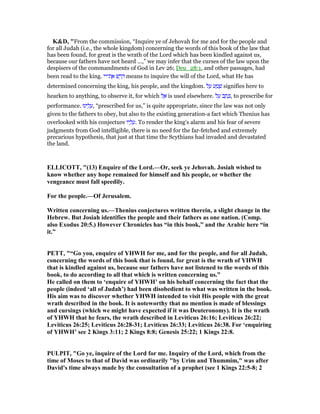
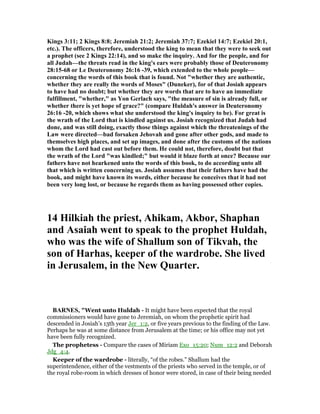
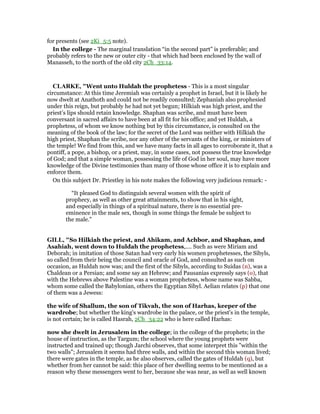
![for her prophetic spirit, prudence, and faithfulness, and not to Jeremiah, who in all
probability was at Anathoth; and so also is the reason why they went not to Zephaniah, if
he as yet had begun to prophesy, because he might be at a distance also: and they
communed with her; upon the subject the king sent them about.
HE RY, "2. This enquiry Josiah sent, (1.) By some of his great men, who are named
2Ki_22:12, and again 2Ki_22:14. Thus he put an honour upon the oracle, by employing
those of the first rank to attend it. (2.) To Huldah the prophetess, 2Ki_22:14. The spirit
of prophecy, that inestimable treasure, was sometimes put not only into earthen vessels,
but into the weaker vessels, that the excellency of the power might be of God. Miriam
helped to lead Israel out of Egypt (Mic_6:4), Deborah judged them, and now Huldah
instructed them in the mind of God, and her being a wife was no prejudice at all to her
being a prophetess; marriage is honourable in all. It was a mercy to Jerusalem that
when Bibles were scarce they had prophets, as afterwards, when prophecy ceased, that
they had more Bibles; for God never leaves himself without witness, because he will
leave sinners without excuse. Jeremiah and Zephaniah prophesied at this time, yet the
king's messengers made Huldah their oracle, probably because her husband having a
place at court (for he was keeper of the wardrobe) they had had more and longer
acquaintance with her and greater assurances of her commission than of any other; they
had, it is likely, consulted her upon other occasions, and had found that the word of God
in her mouth was truth. She was near, for she dwelt at Jerusalem, in a place called
Mishneh, the second rank of buildings from the royal palace. The Jews say that she
prophesied among the women, the court ladies, being herself one of them, who it is
probable had their apartments in that place. Happy the court that had a prophetess
within the verge of it, and knew how to value her.
JAMISO , "Achbor — or Abdon (2Ch_34:20), a man of influence at court (Jer_
26:22). The occasion was urgent, and therefore they were sent - not to Zephaniah (Zep_
1:1), who was perhaps young - nor to Jeremiah, who was probably absent at his house in
Anathoth, but to one who was at hand and known for her prophetic gifts - to Huldah,
who was probably at this time a widow. Her husband Shallum was grandson of one
Harhas, “keeper of the wardrobe.” If this means the priestly wardrobe, [Harhas] must
have been a Levite. But it probably refers to the royal wardrobe.
she dwelt ... in the college — rather, “in the Misnah,” taking the original word as a
proper name, not a school or college, but a particular suburb of Jerusalem. She was held
in such veneration that Jewish writers say she and Jehoiada the priest were the only
persons not of the house of David (2Ch_24:15, 2Ch_24:16) who were ever buried in
Jerusalem.
K&D, "Nothing further is known of the prophetess Huldah than what is mentioned
here. All that we can infer from the fact that the king sent to her is, that she was highly
distinguished on account of her prophetical gifts, and that none of the prophets of
renown, such as Jeremiah and Zephaniah, were at that time in Jerusalem. Her father
Shallum was keeper of the clothes, i.e., superintendent over either the priests' dresses
that were kept in the temple (according to the Rabbins and Wits. de proph. in his
Miscell. ss. i. p. 356, ed. 3), or the king's wardrobe. The names of his ancestors הָו ְק ִ and](https://image.slidesharecdn.com/2kings22commentary-170511172018/85/2-kings-22-commentary-85-320.jpg)
![ס ַח ְר ַה are written ת ַה ְּוק and ה ָר ְס ַח in the Chronicles. Huldah lived at Jerusalem הֶנ ְשׁ ִ ַ , “in
the second part” or district of the city, i.e., in the lower city, upon the hill ᅖκρα (Rob.
Pal. i. p. 391), which is called הֶנ ְשׁ ִ ַה in Zep_1:10, and הֶנ ְשׁ ִמ יר ִע ָה in Neh_11:9, and ᅎλλη
πόλις in Joseph. Ant. xv. 11, 5.
BE SO , "2 Kings 22:14. So Hilkiah the priest, &c., went unto Huldah the
prophetess — This is the only mention we have of this prophetess; and certainly it
tends much to her honour that she was consulted on this important occasion, when,
it is supposed, that not only Jeremiah, but Zephaniah also, was a prophet in Judah.
But Zephaniah, perhaps, might not at that time have commenced a prophet;
because, although we are told he prophesied in the days of Josiah, (Zephaniah 1:1,)
yet we are nowhere informed in what part of Josiah’s reign he entered on the
prophetic office. And Jeremiah might then be absent from Jerusalem, at his house at
Anathoth, or some more remote part of the kingdom; so that, considering Josiah’s
haste and impatience, there might be no other proper person to apply to than this
prophetess. And the king and his ministers, who went to inquire, being well assured
of her fidelity in delivering the counsel of God, concluded rightly, that it was much
more to be regarded what message God sent, than by whom it was conveyed. — See
Poole and Dodd. ow she dwelt in the college — Where the sons of the prophets,
and others who devoted themselves to the study of God’s word, used to meet and
discourse of the things of God, and receive the instructions of their teachers.
COFFMA , " ote that Huldah does not even mention any query about the
authenticity of that discovery, simply because no question about that was necessary.
It was at once recognized for what it was, namely, either the original Book of the
Covenant (the Torah, called also the Pentateuch) which had been placed beside the
ark of God upon the command of Moses, or an authentic copy of the same replacing
it. What Huldah did was to answer the king's inquiry about whether the terrible
curses and penalties were due for an immediate fulfillment or not. The key part of
her reply was that the penalties would not be executed during Josiah's lifetime.
"She dwelt in Jerusalem, in the second quarter" (2 Kings 22:14). "Second quarter
in this place is literally, the lower city."[28]
"Thou shalt be gathered to thy grave in peace" (2 Kings 22:20). Of course, Josiah
died in battle, and that fact gives the critics a cue to allege "contradiction," or
"multiple sources," or "a later editor."[29] Keil gave the true explanation. "The
expression `slept with his fathers,' while usually applicable to a peaceful death, was
also applied to a violent death by being slain in battle."[30] In mercy, the life of
Josiah ended without his living to see the devastation and destruction of his beloved
city and its people, and that, of course, was the full and adequate fulfillment of the
words of the prophetess. "Thus Josiah was taken away from the evil to come and
died `in peace' (as regarded Jerusalem) prior to the attack,"[31] of the destroying](https://image.slidesharecdn.com/2kings22commentary-170511172018/85/2-kings-22-commentary-86-320.jpg)
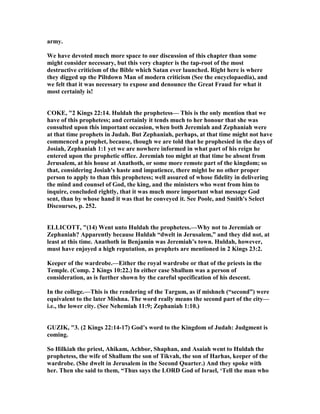
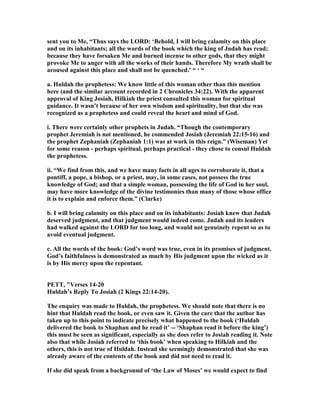
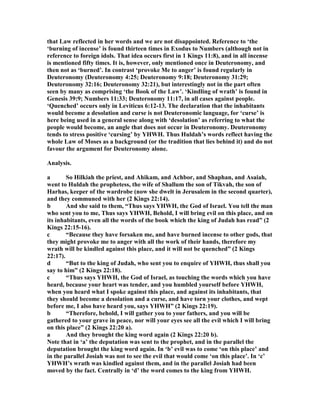
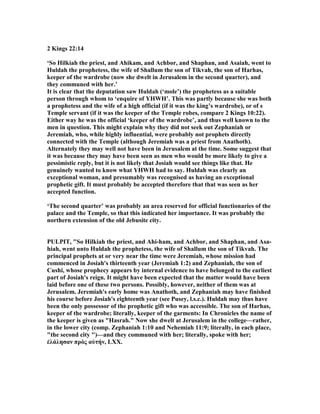
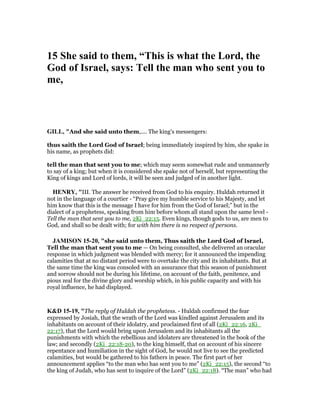
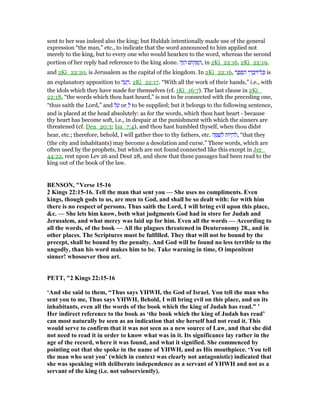
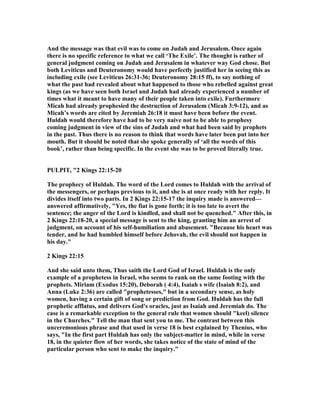
![16 ‘This is what the Lord says: I am going to
bring disaster on this place and its people,
according to everything written in the book the
king of Judah has read.
BAR ES, "All the words of the book - The “words” here intended are no doubt
the threatenings of the Law, particularly those of Lev. 26:16-39 and Deut. 28:15-68.
Josiah had probably only heard a portion of the Book of the Law; but that portion had
contained those awful denunciations of coming woe. Hence, Josiah’s rending of his
clothes 2Ki_22:11, and his hurried message to Huldah.
GILL, "Thus saith the Lord, behold, I will bring evil upon this place, and
upon the inhabitants of it,.... Destruction to the place, and captivity to the
inhabitants of it:
even all the words of the book which the king of Judah hath read; particularly
what is contained in Lev_26:14, even all the curses in it, as in 2Ch_34:24.
HE RY, "1. She let him know what judgments God had in store for Judah and
Jerusalem (2Ki_22:16, 2Ki_22:17): My wrath shall be kindled against this place; and
what is hell itself but the fire of God's wrath kindled against sinners? Observe, (1.) The
degree and duration of it. It is so kindled that it shall not be quenched; the decree has
gone forth; it is too late now to think of preventing it; the iniquity of Jerusalem shall not
be purged with sacrifice or offering. Hell is unquenchable fire. (2.) The reference it has,
[1.] To their sins: “They have committed them, as it were, with design, and on purpose to
provoke me to anger. It is a fire of their own kindling; they would provoke me, and at
length I am provoked.” [2.] To God's threatenings: “The evil I bring is according to the
words of the book which the king of Judah has read; the scripture is fulfilled in it. Those
that would not be bound by the precept shall be bound by the penalty.” God will be
found no less terrible to impenitent sinners than his word makes him to be.
ELLICOTT, "(16) I will bring evil upon . . .—Literally, I am about to bring evil
unto . . . Instead of unto, the LXX., Vulg., and Chronicles rightly read upon, which
follows in the next phrase.
Which the king of Judah hath read.—The book had been read to him as the
chronicler explains. The freedom of expression here warns us against pressing the
words of 2 Kings 22:8; 2 Kings 22:10 (“he read it”).](https://image.slidesharecdn.com/2kings22commentary-170511172018/85/2-kings-22-commentary-94-320.jpg)
![PULPIT, "Thus saith the Lord, Behold, I will bring evil upon this place—i.e.
Jerusalem—and upon the inhabitants thereof, even all the words of the book which
the King of Judah hath read. In the parallel passage of Chronicles (2 Chronicles
34:24) the expression used is stronger, viz, "Behold, I will bring evil upon this place,
and upon the inhabitants thereof, even all the curses that are written in the book
which they have road before the King of Judah." The passage which most strongly
affected Josiah was probably that, already mentioned, in Deuteronomy 28:1-68;
which began with a series of curses.
17 Because they have forsaken me and burned
incense to other gods and aroused my anger by all
the idols their hands have made,[a] my anger will
burn against this place and will not be quenched.’
BAR ES, "Have burned incense - In the marginal reference the corresponding
phrase is: “have served other gods, and worshipped them.” Its alteration to “have bnrned
incense” points to the fact that the favorite existing idolatry was burning incense on the
housetops to Baal Jer_19:13; Jer_32:29 and to the host of heaven 2Ki_21:3.
CLARKE, "My wrath shall be kindled - The decree is gone forth; Jerusalem shall
be delivered into the hands of its enemies; the people will revolt more and more;
towards them longsuffering is useless; the wrath of God is kindled, and shall not be
quenched. This was a dreadful message.
GILL, "Because they have forsaken me,.... My worship, as the Targum; his word
and ordinances:
and have burnt incense unto other gods; to Baal, to the host of heaven, and other
Heathen deities:
that they might provoke me to anger with all the works of their hands: their
idols of wood, stone, gold, and silver, which their hands had made, to worship; than
which nothing was more provoking to God:
therefore my wrath shall be kindled against this place, and shall not be
quenched; the decree for the destruction of Jerusalem was gone forth, and not to be
called back; the execution of it could not be stopped or hindered by cries, prayers,](https://image.slidesharecdn.com/2kings22commentary-170511172018/85/2-kings-22-commentary-95-320.jpg)
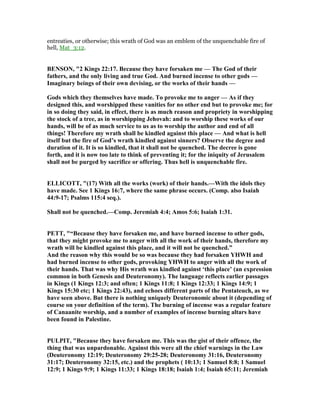
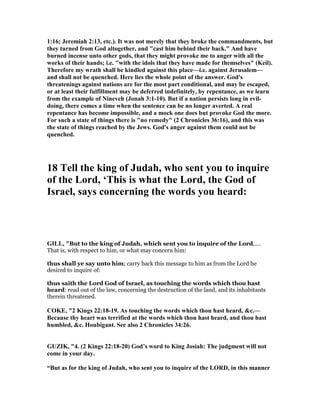
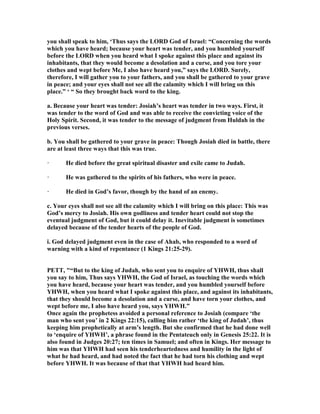
![The message that he had heard and which had so moved him was that YHWH had
spoken ‘against this place’ and against its inhabitants and had promised that they
would become a desolation and a curse. The descriptions were powerful and
emphasised the severity of what was coming. Having accepted it, and having been
moved by it, Josiah had now come to YHWH to seek His mind concerning it. It will
be noted that the way the word ‘curse’ is used is dissimilar to the way in which it is
used in Deuteronomy, although having the same root idea. Here it is the people who
were to become a curse and it is paralleled with ‘desolation’ giving it a more
generalised meaning. The same usage is in fact paralleled in Jeremiah 49:13 where
the idea is similarly general and ‘curse’ is similarly paralleled with other
descriptions. ( ote also its use in Genesis 27:12-13). It is not therefore used in such a
way as to suggest that it specifically had the curses of the covenant in Deuteronomy
directly in mind. This idea of Judah being a curse and a desolation can indeed be
seen as having in mind any of the Pentateuchal warnings of what would happen to
His people if they disobeyed Him (e.g. Leviticus 18:24-30; Leviticus 20:22-23;
Leviticus 26:14-46; Deuteronomy 27:15 to Deuteronomy 29:29).
PULPIT, "But to the King of Judah which sent you to inquire of the Lord, thus
shall ye say to him (see the comment on 2 Kings 22:15), Thus saith the Lord God of
Israel. As touching the words which thou hast heard; i.e. the words that were read
to thee by Shaphan (2 Kings 22:10)—the awful threats which caused thee to rend
thy clothes and to make inquiry of me.
19 Because your heart was responsive and you
humbled yourself before the Lord when you heard
what I have spoken against this place and its
people—that they would become a curse[b] and
be laid waste—and because you tore your robes
and wept in my presence, I also have heard you,
declares the Lord.
CLARKE, "Because thine heart was tender - Because thou hast feared the Lord,
and trembled at his word and hast wept before me, I have heard thee, so far that these
evils shall not come upon the land in thy lifetime.](https://image.slidesharecdn.com/2kings22commentary-170511172018/85/2-kings-22-commentary-99-320.jpg)
